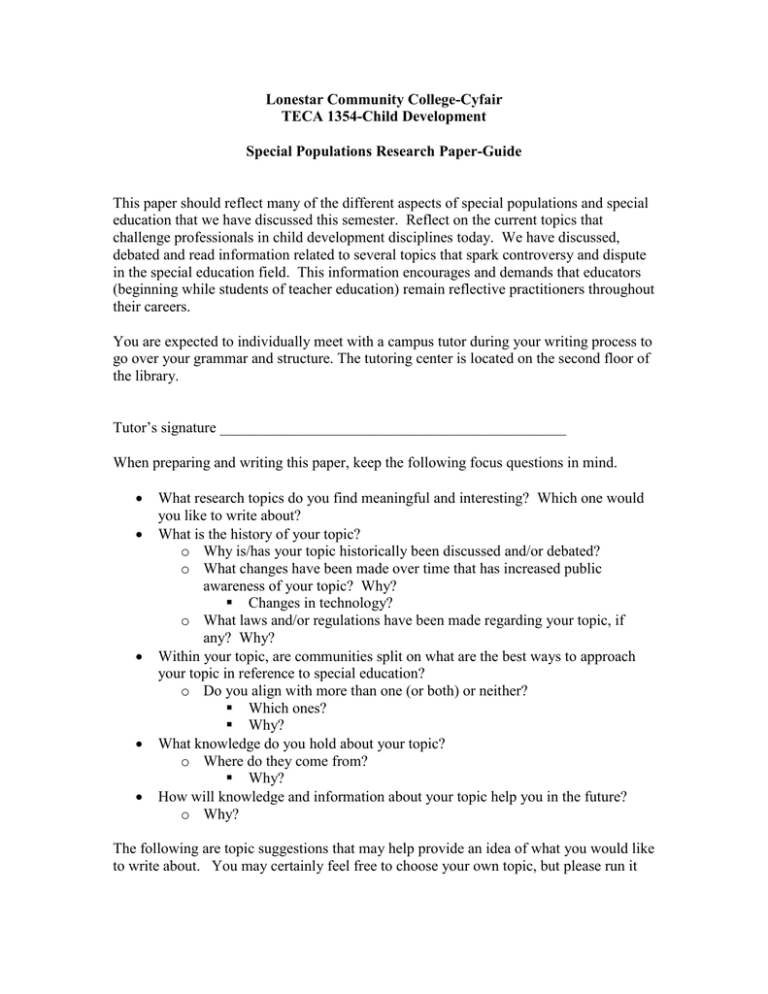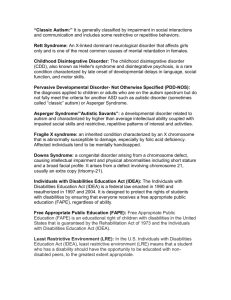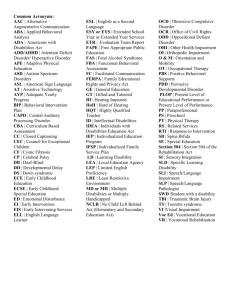Special Education Paper Guide.doc
advertisement

Lonestar Community College-Cyfair TECA 1354-Child Development Special Populations Research Paper-Guide This paper should reflect many of the different aspects of special populations and special education that we have discussed this semester. Reflect on the current topics that challenge professionals in child development disciplines today. We have discussed, debated and read information related to several topics that spark controversy and dispute in the special education field. This information encourages and demands that educators (beginning while students of teacher education) remain reflective practitioners throughout their careers. You are expected to individually meet with a campus tutor during your writing process to go over your grammar and structure. The tutoring center is located on the second floor of the library. Tutor’s signature ______________________________________________ When preparing and writing this paper, keep the following focus questions in mind. What research topics do you find meaningful and interesting? Which one would you like to write about? What is the history of your topic? o Why is/has your topic historically been discussed and/or debated? o What changes have been made over time that has increased public awareness of your topic? Why? Changes in technology? o What laws and/or regulations have been made regarding your topic, if any? Why? Within your topic, are communities split on what are the best ways to approach your topic in reference to special education? o Do you align with more than one (or both) or neither? Which ones? Why? What knowledge do you hold about your topic? o Where do they come from? Why? How will knowledge and information about your topic help you in the future? o Why? The following are topic suggestions that may help provide an idea of what you would like to write about. You may certainly feel free to choose your own topic, but please run it by me. These topics reflect discussions, debates, textbook readings and notes that we have discussed or will discuss further throughout the course of this class. Americans with Disabilities Act (ADA) Augmentative and Alternative Communication Asperger Syndrome Assistive Technology Attention Deficit Disorder (ADD) Attention Deficit/Hyperactivity Disorder (ADHD) Autism Behavioral Disorders Blindness and Low Vision Braile Cerebral Palsy Cochlear Implants Communication Disorders Community Based Instruction (Vocational Instruction) Cued Speech Cystic Fibrosis Deaf-Blindness Deafness and Hard of Hearing Depression in Children Down’s Syndrome Education Programs (Hospital, Home, Center, Combined Home-Center, Family) Emotional Disorders Epilepsy Explicit and Implicit Instruction for Special Populations Facilitated Communication Fetal Alcohol Syndrome (FAS), Fetal Alcohol Effects (FAE) Fragile X Syndrome Gifted and Talented Education Hearing Aids Inclusion Individuals with Disabilities Education Act (IDEA) Individuals Education Program (IEP) Intellectual Disabilities IQ (Intelligence Quotient) Tests Labeling Children with Special Needs Learning Disabilities Least Restrictive Environment (LRE) Mainstreaming and Full Inclusion Manually Coded English Naturalistic Teaching Strategies No Child Left Behind Act (NCLB) Obsessive/Compulsive Disorder (OCD) Parents of Exceptional Children Physical Disabilities Post Traumatic Stress Disorder (PTSD) Profound Disabilities Residential Alternatives for Adults Rett Syndrome Schizophrenia in Children Secretin Therapy Severe Disabilities Sign Language Spina Bifida Stuttering Technology Dependant Students Tourette Syndrome


